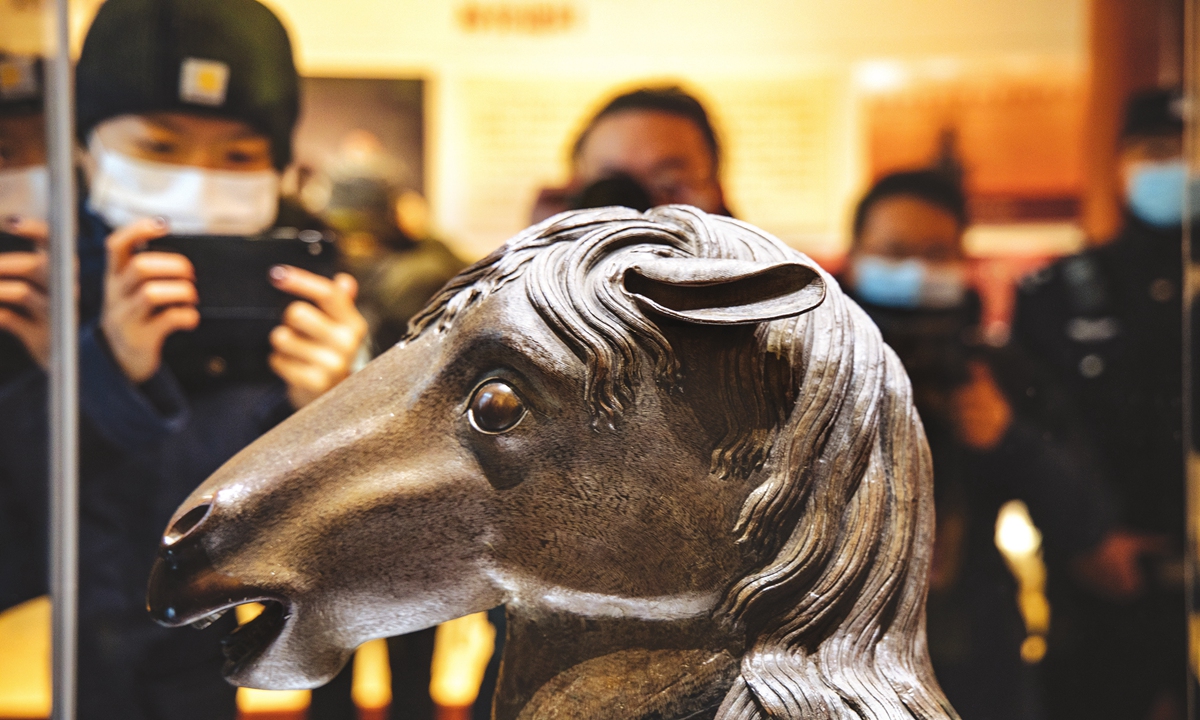
Visitors take pictures of the bronze horse zodiac head that was stolen by invading forces when British and French troops razed the Old Summer Palace in 1860. The statue finally returned to its home, Yuanmingyuan, or the Old Summer Palace. Photo: Li Hao/GT
China's National Cultural Heritage Administration (NCHA) on Sunday launched a webpage dedicated to the international fight against the illegal trafficking of cultural property at a forum marking International Day against Illicit Trafficking in Cultural Property.
A section of the website shows a series of priceless international treasures that are still missing. One of the pieces is a statue of a woman that was stolen from Syria in 2014 at the height of the conflict and later smuggled into Europe.
"The illicit trade in antiquities is the main source of funding for armed groups," NCHA's website said.
Another cultural relic is a stone Buddha head originally belonging to the National Museum of Afghanistan. The website indicates that "many of the museum's collections were destroyed in the war, and thousands of artifacts were looted from the museum by local dealers who smuggled these priceless treasures into the international market. These antiquities remain unaccounted for."
The site also features two databases of the Stolen (Lost) Cultural Relics Information Publishing Platform of China and the Stolen Foreign Cultural Relics Database which are aimed at retrieving lost cultural property.
There is also an introduction to exhibitions held in China about the recovery of Chinese cultural property originally lost overseas, like the exhibition of a bronze horse zodiac head, stolen from the Old Summer Palace and later brought back home thanks to the charity of a Chinese businessman, and an exhibition of Chinese artifacts repatriated from Italy.
November 14 marks the International Day against Illicit Trafficking in Cultural Property established on this day in 1970 when the General Conference of UNESCO adopted the Convention on the Means of Prohibiting and Preventing the Illicit Import, Export and Transfer of Ownership of Cultural Property.
To mark the day on Sunday, China's National Cultural Heritage Administration held related forums in Beijing and Shanghai, inviting experts from the museum and auction industries to discuss how to best protect cultural relics and repatriate those lost overseas.
China has recovered more than 150,000 cultural relics from overseas as of September 2021, the Guangming Daily reported.
Guan Qiang, deputy director of the administration, said at the forum that the international community has engaged in a positive cooperation in combating the illegal trafficking of cultural property and promoting the return of cultural relics in recent years. However, there are still many risks and challenges.
Guan reiterated that China reserves the right of recourse against cultural relics illegally looted from the country.
"Cultural property should be national, which is a basic principle in China, and we also pay attention to the warm concerns of international society," Huo Zhengxin, an expert on art repatriation and a law professor at the China University of Political Science and Law, told the Global Times on Sunday.
Huo pointed out that most cultural relics that have been returned to China were repatriated through non-official means like commercial trade-in and donations from current owners, instead of legal channels such as official diplomatic cooperation between two countries.
"International conventions that do not have powerful supervisory mechanisms cannot be effectively enforced," Huo said, noting some of today's challenges and suggesting that the Chinese government should investigate more on lost cultural relics and come up with targeted methods to retrieve them from their current owners, be they institutions or individuals.
Lazare Eloundou Assomo, UNESCO's Director for Culture and Emergencies, attended the forum via video link and praised China's efforts and remarkable achievements in combating the illegal trafficking of cultural property.

